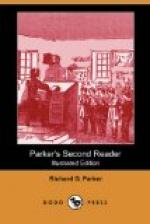2. He kept a carriage, and many servants, some of whom were very much better educated than he was himself.
3. This rich man had been invited out many times to dine with his neighbors; and he observed that at the dinners to which he was invited there were turkeys, and ducks, and chickens, as well as partridges, and quails, and woodcocks, together with salmon, and trout, and pickerel,—with roasted beef, and lamb, and mutton, and pork.
4. But he noticed that every one seemed to be more fond of chickens than anything else, but that they also ate of the ducks and the turkeys.
5. He, one day, determined to invite his friends to dine with him, in return for their civilities in inviting him; and he made up his mind to have an abundance of those things, in particular, of which he had observed his friends to be most fond.
6. He accordingly sent his servant to market, to buy his dinner; and, for fear the servant should make any mistake, he wrote his directions on paper, and, giving the paper, with some money, to the servant, he sent him to the market.
7. The servant took the paper and the money, and set off. Just before he reached the market, he opened the paper, to see what his master had written.
8. But his master wrote so very badly, it took him a long time to find out what was written on the paper; but, at last, he contrived to make it out, as follows:
9. “Dukes would be preferred to Turks; but Chittens would be better than either.”
10. What his master meant by dukes, and turks, and chittens, he could not guess. No such things were for sale at the market, and he did not dare to return home without buying something.
11. As he could find nothing like dukes nor turks, he happened to see a poor woman carrying home a basket full of kittens. This was the most like chittens of anything he could find; and not being able to get what his master had written for, he thought his master meant kittens. He therefore bought the basket of kittens, and carried them home for his master’s dinner.
LESSON XIV.
Demos’thenes.—ORIGINAL.
1. There lived, a great many years ago, in Athens, one of the most renowned cities of Greece, a very celebrated orator, whose name was Demos’thenes.
2. But you will not understand what an orator is, until you are told that it means a person who speaks before a large number of people, to persuade them what to do, or to give them information, or good advice.
3. Thus, when a minister or clergyman preaches a good sermon, and speaks in such a manner as to please all who hear him, convincing them of their duty, and persuading them to do it, he is called an orator.
4. Demos’thenes was not a clergyman, or minister, but he spoke before large assemblies of the Athenians, and they were very much delighted to hear him. Whenever it was known that he intended to speak in public, every one was anxious to hear him.




